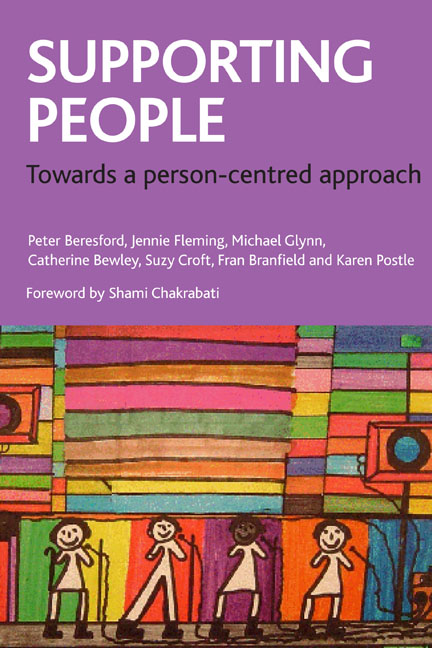Book contents
- Frontmatter
- Dedication
- Contents
- About the authors
- Acknowledgements
- Foreword
- Introduction
- Part One The Background to Person-Centred Support
- Part Two Person-Centred Support: Barriers and Ways of Overcoming Them
- Part Three Broader Issues for Person-Centred Support
- Part Four Making Change to Achieve Person-Centred Support
- Appendices
six - Institutionalisation
Published online by Cambridge University Press: 01 September 2022
- Frontmatter
- Dedication
- Contents
- About the authors
- Acknowledgements
- Foreword
- Introduction
- Part One The Background to Person-Centred Support
- Part Two Person-Centred Support: Barriers and Ways of Overcoming Them
- Part Three Broader Issues for Person-Centred Support
- Part Four Making Change to Achieve Person-Centred Support
- Appendices
Summary
There are stories of our elders who are vegetarians being provided with meat dishes from the meals on wheels service … of an Asian elder, a Hindu living in a residential home, being given beef. There is a lack of respect, inadequate provision for dietary needs, skin and hair care, language and emotional needs…. The list is endless.
… ranging from specific matters such as ‘teeth keep getting lost’ and ‘her hearing aid never works’ to a general comment that care was not good enough.
(Harding and Beresford, 1996, p 28)Standard Six: Combating institutionalisation
Services should support, rather than restrict the human and civil rights of service users. They need to be consistent with human rights and anti-discrimination legislation as well as the Mental Capacity Act. They need to promote service users’ choice and control and resist pressures to institutionalisation, particularly associated with residential and segregated services.
Introduction
In the last chapter, where we focused on ‘informal care’, a tension emerged between people making their own decisions and living independently, on the one hand and, having decisions made for them and being dependent on their families, on the other. This discussion is developed further here, where we look at problems of institutionalisation – the antithesis of independent living and person-centred support – and what works to overcome the barriers associated with it.
Institutionalisation was first associated with the large ‘total’ institutions, like work houses and ‘lunatic asylums’ established in the 19th century (Goffman, 1968). People are socialised into the rules, requirements, routines, restrictions and values of such institutionalised living. It not only limits their lives, but also creates long term damage that makes it difficult for them to live differently. Features associated with institutionalisation include:
• people's rigid categorisation
• being segregated
• being lumped together
• the provision of merely physical maintenance
• group living
• standardised routines
Colin Barnes has described the effects of institutionalisation on disabled people in these terms:
In many cases they are confined to a residential institution and kept from making the most basic of decisions and deprived of the opportunities which able-bodied people take for granted (Brisenden 1985). Disabled people in such places suffer loss of social skills and self-confidence….
- Type
- Chapter
- Information
- Supporting PeopleTowards a Person-Centred Approach, pp. 151 - 182Publisher: Bristol University PressPrint publication year: 2011



